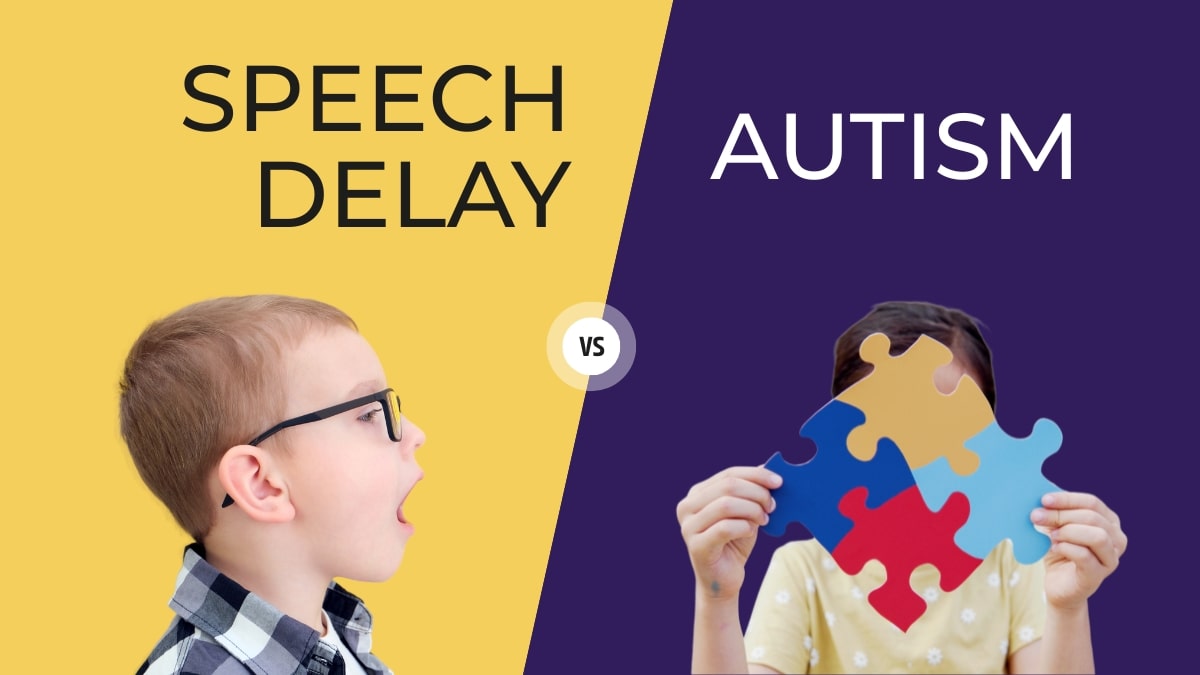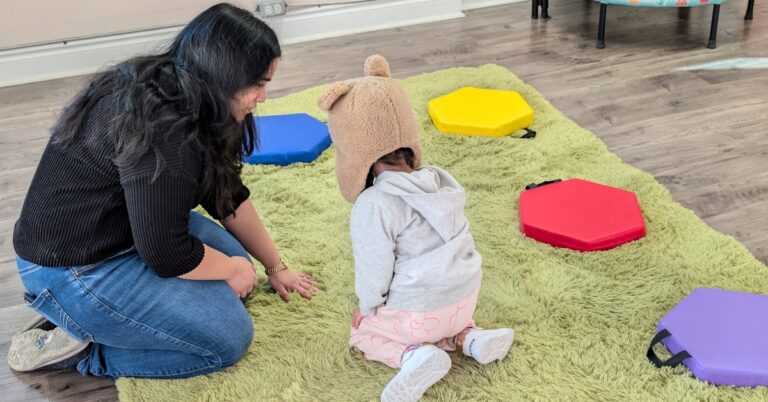It is natural to always want the best for your child. You watch how they grow, learn and play. However, sometimes you may notice that your child is not talking as much as other children and this can make you feel worried. You might wonder if this is just a delay in speech or something more than that like Autism. Well, it is totally okay to have questions as they can help you as a parent to understand what help your child needs easily. According to the Public Health Agency of Canada, approximately 10–15% of preschool children experience speech and language delays.
In this blog, we will discuss the difference between speech delay and autism in simple terms so that you can understand it easily.
What Is Speech Delay?
It simply means that a child is taking more time to learn how to speak and it definitely doesn’t mean that the child will never speak or talk. Many children with speech delays learn to talk well with the right help. A child with speech delay may not speak as many words as other kids of his age. They can face a hard time making sentences by putting the words together. They may not speak the words clearly but they can clearly understand what other people are saying. They may point out the things they want and they can follow simple instructions as well.
What Is Autism?
It is a condition that affects how the children talk, learn and play. A child with autism may find it hard to talk or show how they feel to others. They might not enjoy playing with other kids as well. They may also like to do the same thing over and over again. Also, autism is not the same in every child as some children may have mild signs whereas others may need more support. One more thing is that autism is not caused by anything a parent did, it is basically something a child is born with.
Based on data from the National Autism Spectrum Disorder Surveillance System (NASS), about 1 in 50 Canadian children aged 5–17 is diagnosed with Autism Spectrum Disorder (ASD), with boys being 4 times more likely than girls to be diagnosed.
How Are They Different?
The speech delay and autism both can make it hard for a child to engage in daily conversations still they are not the same. Here are a few important ways to tell them apart.
- A child with only a speech delay usually wants to talk and play. They may also point at things, smile and show their feelings. Also, they enjoy being with people even if they can’t speak many words yet.
- A child with autism may not try to talk or make eye contact with others. They may not smile when you smile at them as well. They might not use the hand signs like waving. Some children with autism may flap their hands or spin around in circles often.
- Also, a child with speech delay usually understands simple words. You can tell them to bring their shoes, and they will do it. However, a child with autism might not respond at all even if they hear you.
Why It’s Important to Know the Difference
If you know the difference between the speech delay and autism so it can help you to get the right help for your child. Every child is unique so some may have both speech delay and autism. Research supported by Statistics Canada shows that early diagnosis and intervention can improve long-term outcomes in over 70% of children with developmental delays. That is why it is important to talk to a doctor or a child expert. If your child is not talking or learning words as expected then it is advisable to start talking to your family doctor. They may ask you to see a speech-language pathologist. This is a person who helps children learn to talk.
When Should You Be Concerned?
Every child grows at their own pace like some children may talk early while others can take a little longer. A Canadian Institute for Health Information (CIHI) report revealed that 36% of children aged 2–5 referred for developmental concerns had delays in speech and language as the primary issue.
These are some signs that can indicate if your child needs help:
- If your child is 12 months old but can not speak simple words like “mama” or “dada.”
- If your child is 18 months old and can not use at least a few simple words.
- If your child is 2 years old and can not put two words together like “want food.”
- If your child does not make eye contact or look at you when you talk or doesn’t seem interested in listening.
- If your child does not play pretend games like feeding their food to a toy or doll.
What Kind of Help Can My Child Get?
Well, there are many kinds of help available for children with speech and autism. If your child has a speech delay then a speech therapist can work with your child to help them say words and talk clearly. They can also use fun games and playtime to help children learn. If your child has autism then they may also need other kinds of therapy like behaviour therapy. These types of therapies can help your child learn how to talk, play and make friends.
What Can You Do at Home?
You can help your child at home as well through simple and effective everyday activities like:
- You can talk in short sentences with your child.
- You can read books with your kids.
- You can use gestures and facial expressions.
- You can play interactive games with them.
- Most importantly, you should give your child enough time to respond.
If you create a calm, warm and loving space for your child then it will encourage your child to learn things fast and express themselves confidently.
Final Thoughts
We have discussed that every child is different that is why understanding the difference between speech delay and autism helps you get the right process early. If you have any concerns about your child’s speech or behaviour, reaching out early can truly make a world of difference. Mind Grove Therapy is here to provide support in speech therapy and autism care. Our dedicated team designs personalized, play-based programs that help children communicate, play and thrive.



